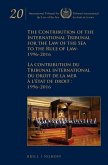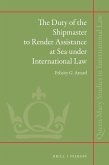This collection of essays on the law of the sea by leading academics and practitioners, including judges at International Tribunal of the Law of the Sea, and legal advisors at the UN and World Bank addresses the development, content and future direction of the law of the sea under the 1982 UN Convention on the Law of the Sea. It focuses on topics of long-standing and contemporary concern, such as navigation, security and the protection of natural resources.
It is now more than ten years since the 1982 United Nations Convention on the Law of the Sea (LOSC) came into force and more than twenty years since it was concluded in December of 1982 after more than nine years of negotiations. The famous "package deal" that it represented addressed many of the problematic issues that previous conventions had been unable to settle. This collection of essays, by leading academics and practitioners, provides a critical review of the LOSC and its
relationship to and interface with the wide range of developments which have occurred since 1982.
The individual chapters reveal a number of core themes, including the need to maintain the integrity of the LOSC and its centrality to oceans regulation; the tension between regional global regimes for oceans governance and the struggle to reconcile these within the LOSC; the gradual consolidation of authority over oceans space; the difficulty of adapting some of the more dated provisions of the LOSC to deal with unforeseen contemporary issues of oceans use; and the consequent development of
the general obligations of the LOSC through binding and non-binding agreements. They clearly indicate the potential impact and role of post-LOSC agreements and institutions in developing the law of the sea and resolving some of the outstanding substantive issues. From this it is clear that the future
of the Law of the Sea will involve an understanding of the wider legal environment within which it operates.
Hinweis: Dieser Artikel kann nur an eine deutsche Lieferadresse ausgeliefert werden.
It is now more than ten years since the 1982 United Nations Convention on the Law of the Sea (LOSC) came into force and more than twenty years since it was concluded in December of 1982 after more than nine years of negotiations. The famous "package deal" that it represented addressed many of the problematic issues that previous conventions had been unable to settle. This collection of essays, by leading academics and practitioners, provides a critical review of the LOSC and its
relationship to and interface with the wide range of developments which have occurred since 1982.
The individual chapters reveal a number of core themes, including the need to maintain the integrity of the LOSC and its centrality to oceans regulation; the tension between regional global regimes for oceans governance and the struggle to reconcile these within the LOSC; the gradual consolidation of authority over oceans space; the difficulty of adapting some of the more dated provisions of the LOSC to deal with unforeseen contemporary issues of oceans use; and the consequent development of
the general obligations of the LOSC through binding and non-binding agreements. They clearly indicate the potential impact and role of post-LOSC agreements and institutions in developing the law of the sea and resolving some of the outstanding substantive issues. From this it is clear that the future
of the Law of the Sea will involve an understanding of the wider legal environment within which it operates.
Hinweis: Dieser Artikel kann nur an eine deutsche Lieferadresse ausgeliefert werden.









